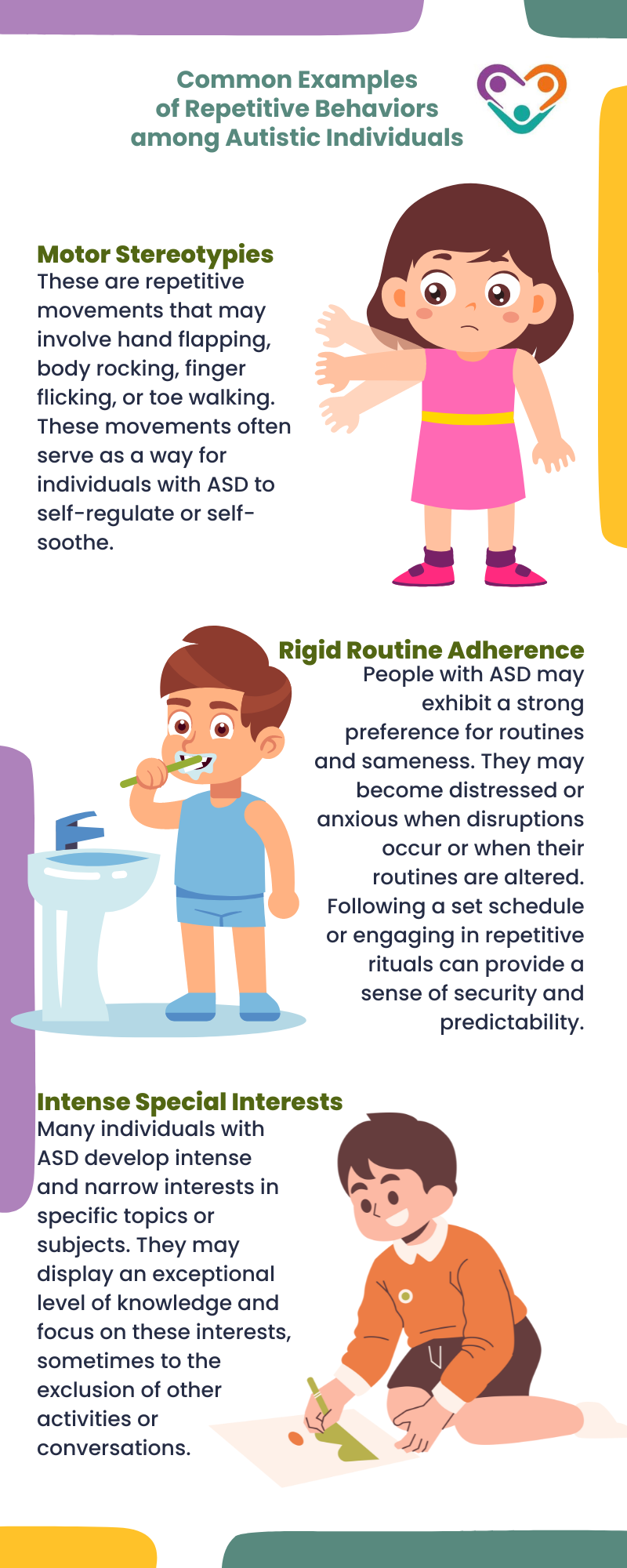Simple steps Autism Behavioral Therapy techniques ease transitions
Simple steps Autism Behavioral Therapy techniques ease transitions
Blog Article
Key Symptoms And Signs to Recognize in Individuals With Behavioral Autism
When you encounter a person with behavior autism, acknowledging key signs and signs is crucial. You might discover obstacles in social communications and communication, along with a strong demand for routines. In addition, sensory sensitivities can result in overwhelming experiences. Recognizing these traits can boost your assistance and treatments, yet there's more to reveal concerning exactly how these habits manifest in day-to-day situations. Let's explore what these signs actually appear like.
Difficulties in Social Interactions
When you engage with somebody on the autism spectrum, you could observe they have a hard time with social cues and interaction. These challenges can make social interactions really feel overwhelming for them.
When they do involve, they might talk regarding their rate of interests in terrific information without seeing if you're interested. Recognizing these difficulties can help you come close to interactions with empathy and perseverance, promoting a much more comfortable setting for both of you.
Trouble With Verbal and Non-Verbal Communication

Non-verbal communication can be a lot more difficult. You could see an absence of eye get in touch with or restricted usage of motions, which can make interactions really feel awkward. Face expressions may not always line up with the conversation, causing confusion regarding their sensations. Identifying these indicators is crucial, as it helps you far better support and involve with individuals on the autism range. By comprehending their communication obstacles, you can foster more significant connections and supply a much more supportive environment.
Repetitive Behaviors and Regimens
Communication obstacles typically accompany various other indicators of autism, such as repeated habits and a solid preference for routines. You might observe that people with autism often take part in specific, repetitive activities, like hand-flapping, rocking, or duplicating expressions. These habits can supply comfort and a sense of control in a frequently frustrating world.
Routines are equally important; lots of individuals thrive when they follow a structured timetable. You may discover that adjustments to these routines can lead to significant distress. If they have a daily routine of eating morning meal at a specific time or following a specific path to institution, any type of disturbance can cause anxiousness.
Acknowledging these patterns helps you recognize their behavior and offer support. By suiting their demand for routine and permitting recurring activities, you can produce a more comfortable environment that eases their challenges.
Sensory Level Of Sensitivities

Typical Sensory Triggers
Sensory level of sensitivities can substantially impact daily life for individuals with autism, as particular stimulations often activate overwhelming reactions. Usual sensory triggers include loud noises, bright lights, and strong smells. You might discover that sudden sounds, like sirens or alarms, cause anxiety or distress. Likewise, fluorescent illumination in stores can feel rough and uneasy. Structures can likewise play a considerable role; rough fabrics or specific food textures may be intolerable for you. Additionally, crowded areas can bewilder your detects, making it hard to focus or relax. Recognizing these triggers can assist you manage your setting better. By knowing what affects you, you can take actions to decrease pain and enhance your day-to-day experiences.
Behavioral Reactions Described
Understanding your behavior feedbacks to sensory level of sensitivities is essential, as they often expose exactly how you engage with the world. You might see that particular sounds, lights, or textures bewilder you, resulting in anxiousness or pain. When confronted with these stimuli, you may withdraw, cover your ears, and even respond strongly. These responses aren't simply traits; they're your method of dealing with overstimulation. You may also discover yourself looking for certain sensory experiences, like deep pressure or silent atmospheres, to help ground on your own. Identifying these patterns helps you comprehend your requirements much better and can guide how you communicate them to others. By acknowledging your sensory level of sensitivities, you can work in the direction of producing an atmosphere that really feels a lot more comfy and convenient for you.
Coping Techniques Introduction
Identifying your sensory sensitivities is just the initial action; currently it's time to discover coping approaches that can help you take care of those experiences effectively. Start by creating a sensory toolkit customized to your demands. Developing an organized regimen can also offer predictability, decreasing anxiety around sensory overload.
Limited Passions and Emphasis
While several individuals develop a large range of interests, those with autism frequently demonstrate restricted rate of interests and an intense focus here on particular topics. You could observe that someone with autism can invest hours delving into their preferred subject, whether it's a certain sort of train, a details movie, or a clinical principle. This intense emphasis isn't just a hobby; it can come to be a central component of their identity and social communications.
You might find that discussions rotate around these rate of interests, and they may battle to engage in more comprehensive topics. By recognizing and acknowledging these restricted passions, you can foster a supportive setting where they feel valued and comprehended, enabling for even more purposeful connections and interactions.
Psychological Law Difficulties
People with autism usually encounter obstacles in psychological guideline, which can be affected by their extreme emphasis on certain rate of interests. You may discover that when a person is deeply engaged in a preferred task, they can experience solid emotions, whether excitement or disappointment. When things don't go as intended., this strength in some cases makes it hard for them to change equipments or manage their sensations - Autism Behavioral Therapy.

Irregularity in Developing Milestones
When it pertains to developmental turning points, you'll see that individuals with autism typically reveal a broad array of variability. Some might strike landmarks on time, while others could drag or development at a different pace. As an example, you could see a youngster excel in language skills however deal with social communications. This variance can be complex, as traditional benchmarks don't always apply.
It's essential to recognize that each person's trip is one-of-a-kind. Some might create intricate abilities early, only to face difficulties in the future. Others might take longer to achieve basic landmarks yet after that prosper in particular areas. Observing these patterns can help you comprehend their strengths and needs much better.
Frequently Asked Questions
How Is Autism Detected in Kid and Grownups?
To identify autism in grownups and kids, professionals review actions, interaction skills, and social interactions. They usually utilize standard examinations, interviews, and observations to determine if an individual fulfills the requirements for autism spectrum problem.
Exist Various Kinds Of Autism Spectrum Disorders?
Yes, there are various sorts of autism spectrum problems, including Asperger's syndrome and prevalent developmental disorder-not otherwise specified. Each kind varies in extent and qualities, so recognizing these distinctions can help you better support people with autism.
What Therapies Are Effective for Individuals With Autism?
When considering reliable treatments for people with autism, you'll locate options like Applied Habits Evaluation, speech therapy, and job-related therapy. Each method can aid improve communication, social abilities, and daily working customized to individual requirements.
Can People With Autism Lead Independent Lives?
Yes, people with autism can lead independent lives. With the right support, abilities training, and sources, you can aid them develop self-sufficiency, handle day-to-day jobs, and thrive in different settings, fostering their independence.
Exactly How Can Family Members Assistance Loved Ones With Autism?
You can support your liked ones with autism by producing an organized setting, encouraging their interests, practicing persistence, promoting interaction, and advertising social abilities. Commemorate their success, regardless of how small, and develop an encouraging community.
Although numerous people on the autism range can make use of and understand language, they often face considerable challenges with both non-verbal and verbal communication. Identifying these signs is important, as it aids you far better support and engage with people on the autism range. You may discover that people with autism commonly engage in details, repeated actions, like hand-flapping, rocking, or repeating phrases.Sensory level of sensitivities can substantially influence everyday life for individuals with autism, as certain stimulations usually cause frustrating reactions.When it comes to developmental milestones, you'll see that people with autism commonly show a broad range of irregularity.
Report this page